When it comes to dystopian books, there are a lot of fish in the sea. In fact, some novels are, quite literally, about fish coming out of the sea (Undertow, anyone?). But if your doomsday reading list only includes books from George Orwell, Aldous Huxley and Ray Bradbury, you’re missing out on some dystopian goldmines.
What are dystopian books?
While a eutopia (also someone called a utopia) is a good or perfect world, a dystopia is a society that is unjust, and often full of suffering. Dystopian books often take an unpleasant facet of real society and bring it to the extreme, creating worlds that usually have tyrannical governments (or no government at all), rampant disease, environmental terrors, or other factors that cause human misery.
What is the most popular dystopian book?
Perhaps the most popular dystopian book is 1984. As one of the most famous dystopian books to talk about government corruption, 1984 imagines a world where censorship and propaganda run rampant, and shows the way truth and facts can be manipulated.
Other popular dystopian books include The Handmaid's Tale, The Hunger Games, and Atlas Shrugged.
While many of us were exposed to books like 1984, Brave New World and Fahrenheit 451 in school, there are far more examples within this genre. To celebrate them, we've created a list of killer recommendations so you can broaden your dystopian book horizons.
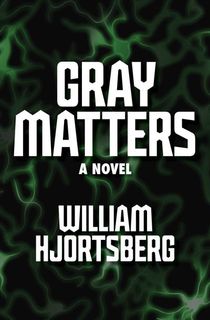
Gray Matters
In this science fiction dystopian novel, 12-year-old Skeet is the only survivor of a plane crash—kind of. His body is destroyed, but doctors are able to salvage his brain, preserving it in a fish tank. Four hundred years later, it has become normal for people’s brains to be preserved, granting them immortality.
The brains pass their days watching film clips, learning about new topics, and meditating. But Skeet, their most famous, still-living resident, is a problem—as an eternal adolescent, he still wants to be a cowboy. To avoid this embarrassment, his keepers come up with a solution that will bend the laws of nature further than ever before.
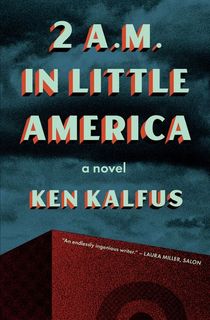
2 A.M. in Little America
In the future, civil discord has made the United States unsafe, and so America's young people flee to wherever they'll be accepted. In one of the countries where migrants are tolerated, Ron Patterson resides in “Little America,” and after a decade, he finally feels secure again. But political divisions are jeopardizing his newfound safety.
This "highly readable, taut novel” (The New York Times Book Review) asks fascinating questions: What happens when privilege is reversed? And how do factious politics affect our ability to ascertain the truth?
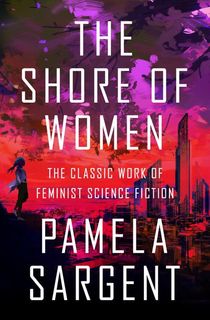
The Shore of Women
In this feminist dystopian classic, Sargent unveils a post-war society, where men are exiled and used only for loveless reproduction. When a lone woman finds herself living amongst the men, she must fight for her life just as she fights to fix her flawed, female-dominated world. Check this one out for a refreshing reversal of dystopian and post-apocalyptic tropes.
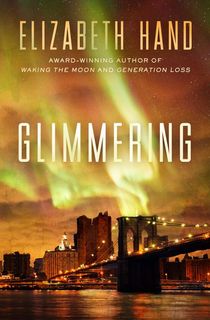
Glimmering
Though it was published 30 years ago, this dystopian novel is timelier than ever. The earth is struck by climate change, rampant viruses, and fundamentalists. Jack Finnegan is hiding out in his family's decrepit mansion, though his death from AIDS is inevitable—or it seems to be, until an old friend claims to have a cure.
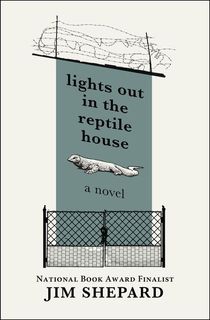
Lights Out in the Reptile House
Though Karel Roeder lives in a country that has elements of Italy under fascism, South Africa under apartheid and Chile under its military regime, all he wants to do is learn from his mentor at the zoo’s reptile house and spend time with his girlfriend, Leda.
But he soon finds that inaction and innocence are no longer an option, especially after Kehr, a special assistant of the civil guard, billets himself in Karel’s home. A National Book Award finalist, this coming of age dystopian novel takes “a fresh, horrifying look at man’s inhumanity to man” (Library Journal).
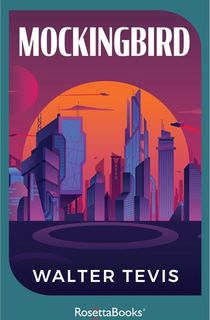
Mockingbird
Featuring elements of Brave New World, this dystopian tale from acclaimed author Walter Tevis imagines a world with no children, no art, and no reading. The world is run by Spofforth, the most perfect machine ever created. Yet Spofforth wishes to die, and is jealous of the love brewing between Paul and Mary Lou, a man and a woman who have found passion in one another despite their bleak existence.
“Because of its affirmation of such persistent human values as curiosity, courage, compassion, along with its undeniable narrative power, Mockingbird will become one of those books that coming generations will periodically rediscover with wonder and delight.” —The Washington Post
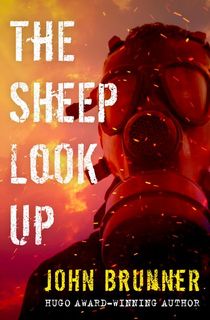
The Sheep Look Up
Brunner’s dystopia is a look at a future where environmental destruction has run amok. Disease, birth defects, and air pollution are so rampant that citizens wear gas masks, and the poor are forced to drink fetid, unsafe water. Overpopulation has led to a corrupt government, while violent eco-terrorists wreak havoc across the globe.
Both groups are after Austin Train, an environmentalist on the lam whose expertise makes him a valuable ally or a terrible enemy.
Related: Shocking Depictions of the Future in Sci-Fi and Fantasy, from The Portalist
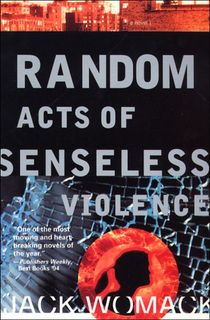
Random Acts of Senseless Violence
When 12-year-old Lola Hart’s parents have financial troubles, her world is upended. No longer able to afford their Manhattan apartment or private school, they move to Harlem, where Lola enrolls in public school. And the Harts are far from the only people having trouble—through Lola’s diary, we read about the riots, gangs, and civil unrest tearing apart New York and the rest of the country—it’s not unlike the world Anthony Burgess created in A Clockwork Orange.
In this novel, “Womack’s stark vision of the United States’s decline is an uncompromising satire that, perhaps even more than it did in the mid-1990s, forces us to confront a world instantly recognizable as our own” (Los Angeles Review of Books).
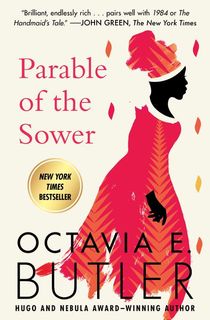
Parable of the Sower
Lauren lives in an America lost to drugs, war, and a lack of resources—an especially dangerous situation for a girl whose "hyperempathy" makes her sensitive to the pain of others. When her family and safe neighborhood is lost to fire, Lauren leads a group of refugees north, where she dreams up an idea that might just change the world.
If you like Parable of the Sower, you’ll love the sequel, where a dangerous political candidate attempts to reunite America through racism, isolationism, and religious intolerance. The pièce de résistance? The candidate’s slogan is “Make America Great Again.”
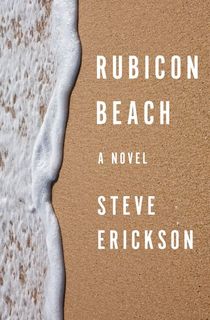
Rubicon Beach
When prisoner Cale is released into the dystopian Los Angeles, he becomes disturbed by strange visions of his own death. At the same time, a mysterious woman stumbles from job to job, until she finds work with a screenwriter obsessed with numerology. Their paths will eventually intersect—and with trippy consequences—in this dark and ethereal novel by surrealist author Steve Erickson.
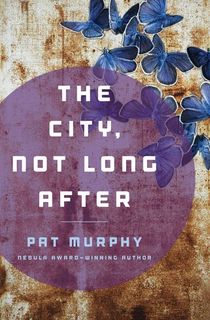
The City, Not Long After
From Nebula Award-winning author Pat Murphy comes this chilling post-apocalyptic novel of hope, art, war and despair. Most of the world’s population has been wiped out by a plague. In San Francisco, the survivors—painters, writers, dreamers—begin the rebuild the city in their own image, hoping to create a society based on peace, community, and art. But not everyone agrees with those ideals.
When Jax shows up in San Francisco, she brings news of a power-hungry man looking to rebuild America for himself. His vision includes the Golden Gate Bridge—and he has an army willing to take it.
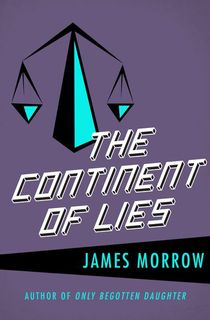
The Continent of Lies
In this dark and satiric book, virtual reality is the fad of the era. Players eat a cephapple, or “dreambean,” and enter their desired reality: love stories, war stories, and even horror stories. Similar to our present-day film critics, Quinjin’s job is to write critiques of these adventures for potential consumers. But when a new, illicit “dreambean” takes people to a nightmare hallucination that drives them mad, Quinjin’s new job is to prevent the news from destroying the "dreambean" industry...Prepare for a major mindtrip!
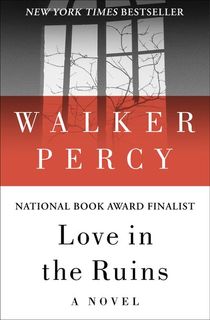
Love in the Ruins
Walker Percy’s surprisingly funny dystopian book begins in a “future” U.S. where Americans are violently polarized along racial, political, and social lines. Meanwhile, a seemingly endless war continues abroad. The only thing standing between America and ruin? A device called a Lapsometer, which is capable of diagnosing all of society’s ills.
Dr. Thomas More—a psychiatrist, inventor and former mental patient—goes on an odyssey to cure the world, equipped with his own Lapsometer. More satire than dismal prophecy, this is a light-hearted addition to your dystopian list.
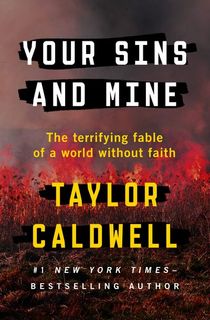
Your Sins and Mine
Best-selling author Taylor Caldwell was best known for her historical fiction novels, but she also penned a dark fable about a world without faith. First, there was the drought—there was no rain, no snow, and the creeks and rivers went dry. But global warming was the least of their problems—things got much worse after the moon vanished and the clocks stopped.
Next, a sulfurous fog began to roll across the land, choking all living things within reach. And when the government finally arrives, it’s not to help—they have a reason far more deadly than anyone can imagine.

Oryx and Crake
When you think about dystopian books, you probably think of Margaret Atwood's 80s classic The Handmaid's Tale. But you should also check out her more recent venture, Oryx and Crake, which portrays a world where corporations control the population with gene manipulation. Eerie and complex, Atwood skillfully examines the inevitable consequences of an increasingly divided America through the story of one man’s lost love.
Related: 20 Books Like The Handmaid's Tale

On Such a Full Sea
Lee's America is in the same doldrums of decay, but it's also a startlingly original take. Here, the descendants of poor provincial Chinese people make up the labor class and are segregated from the rich. When Fan, a female fish-tank diver leaves her settlement to search for the man she loves, her forbidden journey through the lawless open country will become legend—especially to those she’s left behind. More than your average dystopian book, On Such a Full Sea explores myth, art, and truth.

The Running Man
Ben Richards is so desperate for cash that he signs up for The Running Man, a televised game show where runners wander the world while stalked by paid hunters and law enforcement. Their prize: cash for every hour they stay alive.
Set in a dystopian world of collapsing economies and rising violence, the plot of The Running Man may sound a little familiar, but that’s because it’s the granddaddy of the televised kill-fest The Hunger Games takes its cues from. It’s also reminiscent of King’s first psychological horror book, The Long Walk, in which contestants must keep walking—or die.

The Water Knife
Paolo Bacigalupi is the underappreciated modern master of the dystopian genre. Here, his ingenious world-building is on full display, as he presents a disturbing future where water is the major currency—and one that everyone will kill for.




